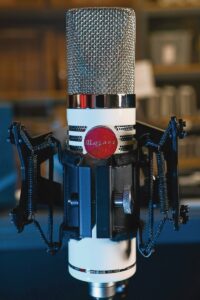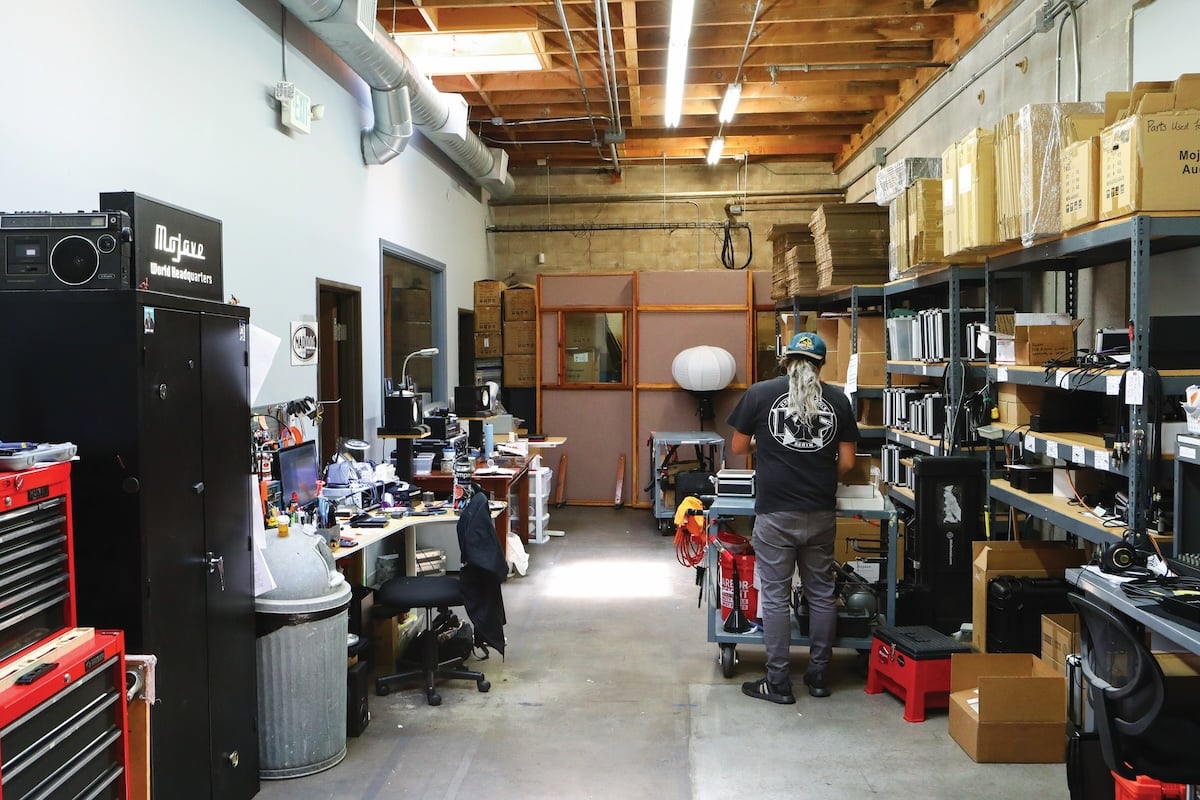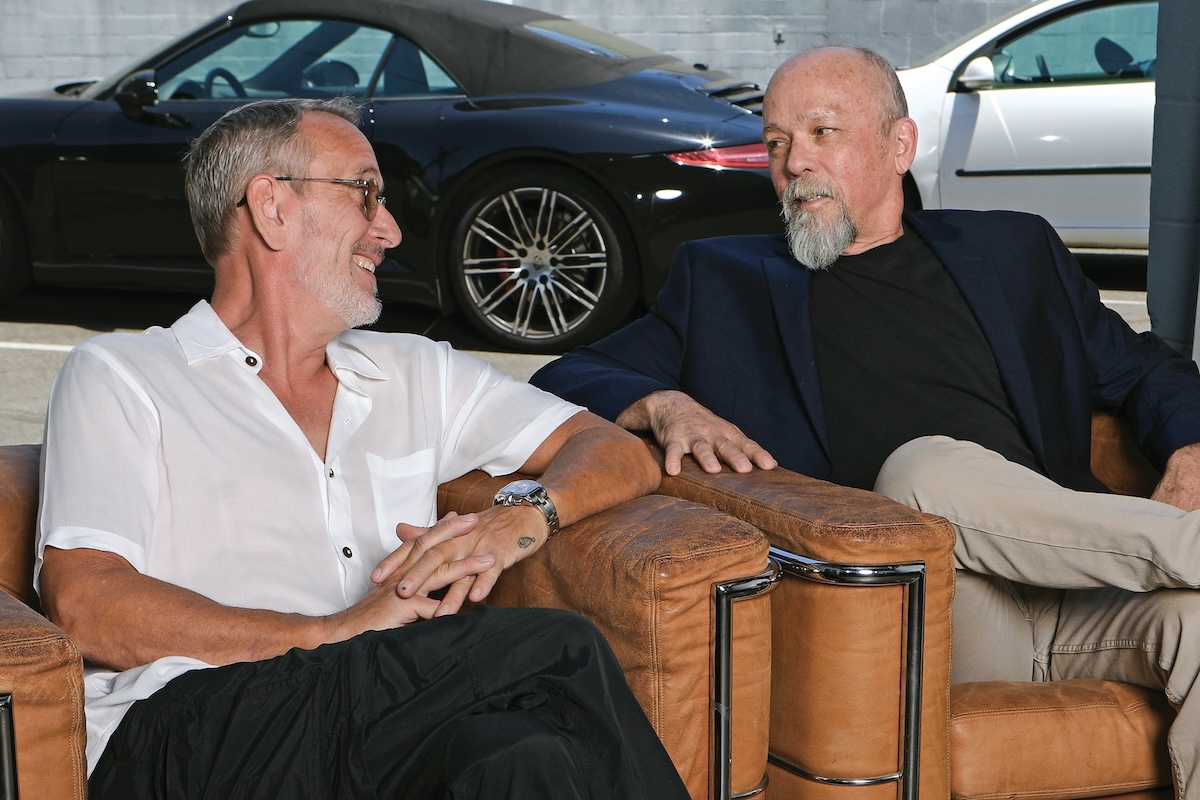Tucked away in a cinder block warehouse complex in a Burbank neighborhood, Mojave Audio Inc. produces some of the music industry’s hottest boutique microphones.
Designed by audio mastermind David Royer, the company’s condenser and dynamic mics are the tools of choice for many recording and performing artists. A pair of longtime producers and musicians – Dusty Wakeman and Colin Liebich – run the business and handle marketing and sales to put the mics in those artists’ hands and stands.
“We both have a background, which I think is a really key point to our success – that we actually make records and actually use this stuff,” Wakeman, the company’s president, said. “We’re not just MBAs selling numbers. When we go out and do marketing, we’re talking about recordings and actual use. We’ve lived it.”
And during the pandemic, the company’s sales continued to climb as people switched to remote work options and as personal recording for music and podcasting only grew. As we emerged from the pandemic, the surge in artist tours and music festivals have also brought good fortune to Mojave.
As the company approaches its second decade, its leaders aim to continue its year-over-year growth pattern and further advance its technology. Reminiscent of the famed singer-songwriter duos in music, the pair of Wakeman and Liebich looks to be a significant factor in that success. The company’s sales have grown about 50% since they joined forces in 2019.
“I think that’s because of our alliances and how we handle things. We’re both very open to listening to how to do it better,” Liebich said.
From bikes to Burbank
Mojave’s origins are a bit like something out of a movie.
Royer had developed an affinity for music and sound quality as a boy and, as an adult, began to teach himself the ins and outs of microphone engineering. He would ultimately pair that knowledge with four years of experience in the U.S. Navy as a sonar technician to begin his life’s work.
In the earliest days, Royer was known for working out of the garage at a cabin near Joshua Tree – in the Mojave Desert – and delivering a mic he’d just tinkered with to the Rancho De La Luna studio there, often inside of a sock and on a cheap dirt bike. Known for his work in the niche ribbon microphones, Royer eventually formed Royer Labs.
Wakeman, who was then a record producer and owned the former MadDog Studios in Burbank, had heard these stories of the desert microphone guy for years. He also became a customer and endorser of Royer Labs – later learning that these were the same person.
“He’s a desert rat and I’m a desert rat – I had a guest ranch out there for like 18 years – and heard about this guy that would show up to a session with a mic in a sock on like a Honda 175 or something in cut offs, just sun-baked,” Wakeman recalled. “And then I got to be an endorser for Royer ribbons, and finally made the connections – ‘Oh, you’re that guy!’”

While Royer Labs had made a name for itself with ribbon mics – so-called for the fragile ribbon inside of the device, and often preferred for guitar or horns recording – Royer himself was dabbling into other microphones – condenser mics, for all-purpose recording, and dynamic mics made for live performances. For this, he formed Mojave Audio in 2005, and that’s when Wakeman entered the picture.
“I was a studio owner, producer and engineer for like 28 years. In 2000, I had gotten to know these people, and was kind of burned out on making records after all those years. And my second kid came along and I was kind of looking for a lifestyle change,” Wakeman said.
“And they had a new product, Mojave mics, and they were looking for somebody to run the startup company. I’ve been doing it ever since,” he added.
Building a strong brand
Liebich – a musician who owns a recording studio, Plastic Dog Recording, in Mar Vista – joined Mojave in 2019 after buying out one of its then-partners.
“The brand has quite nice recognition and a very good name for quality,” Liebich said. “I was a customer of the brand before I came in as a partner.”
The pair characterized 2019 as a fork in the road for Mojave, and they evidently picked the correct path. Since Liebich joined in 2019, they said Mojave has annually had its best year yet in terms of sales. This year, they said they’re on track for 20-25% sales growth.
In this time, Mojave was able to branch out into its own space after sharing a location with Royer Labs for most its existence.
The growth continued even through Covid-19, as people worked in home offices and held video meetings or people in need of a hobby took up an instrument.
Sound engineers like Daniel Lanois (who works with U2 and Peter Gabriel) and Dave Catching (who works with Foo Fighters and Queens of the Stone Age), as well as performers Selena Gomez, Miley Cyrus and Jaime Cullum use Mojave mics. Top sellers include the MA-201 model, which retails for $849, and the $1,549 MA-300.
The most basic half of the microphones are assembled in China, while technicians assemble and solder the key components here in Burbank.

Ever the perfectionist, Royer himself tests each and every mic before it’s packaged for sale – a test that includes leaving them powered for 24 hours. Royer also leaves a handwritten signature on a card in each product box.
And for any technical issues, Mojave will repair all devices for its customers.
“Part of being engineers in the studio is we know the pain of somebody wanting to use their favorite microphone and have it not working,” Wakeman said. “So we’re really big on that and our customer service –anything to get the customer back up as soon as possible – because we’ve been there.”
Watching the landscape change
As they’ve embraced the hardware side of the business, Wakeman and Liebich have had front-row seats to huge shifts in the recording industry.
For one, the days of big recording studios are waning, most recently punctuated by the announced closure of Hollywood’s legendary Record Plant last month. Sunset Sound, another Hollywood mainstay, has also signaled this year it was struggling to stay in business.
“After the year 2000, budgets started going down. Producers, what they used to get paid as a producer advance became the whole budget,” Wakeman explained. “So instead of having a $50,000 producer pitch, you’d have a $50,000 budget by going back to record whatever you got left over.”
Quality mid-level audio equipment like Mojave’s products is as accessible as ever. However, that accessibility has created a tradeoff for the traditional studios of music industry, the pair contended.
“It’s put most of them out of business,” Liebich said.
Wakeman – who has worked with such artists as Dwight Yoakam, Lucinda Williams, Roy Orbison at his former studio – hung up the hat at MadDog when he started at Mojave.
Liebich has continued running his own studio – as have many other smaller producers and audio engineers who often operated in nondescript locations.

“The boutique studios are doing way better than the big studios, because it’s based on the producer,” Liebich said. “It just depends on what you’re working on. We can pay the rent based on who we bring in, and the amount of work.
“Look at where records are made now. It’s completely different,” he added. “There’s only a few big studios left and they get all the business and that’s why they survive. The technology for the gear now, it’s so good that you don’t need to be in some $2,500-a-day studio.”
This accessibility does mean it’s much easier than it used to be for aspiring artists to get well-recorded music onto platforms like Spotify or YouTube. But, with so many artists uploading at a rapid clip, it’s harder for them to get noticed. And with fewer studios and professionals in the mix, there are fewer gatekeepers “to keep the dreck out,” Wakeman said.
“But we don’t discriminate,” he quipped.